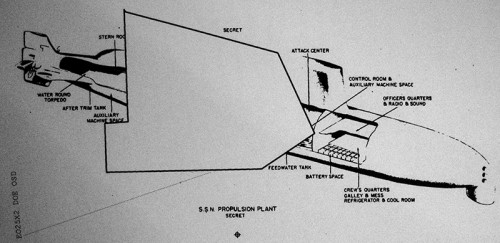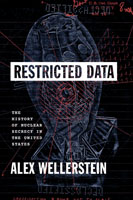On my post for Day 1 of this week’s archival trip, I noted that the Lexis Nexis database of Executive hearings of the Joint Committee on Atomic Energy (JCAE) was empty after 1962. I wondered if that could possibly be accurate or not.
The answer, after fishing around for a week, is clearly no. There are a bunch of Executive sessions that are not in the Lexis Nexis database, especially from the 1960s and a few from the 1970s. Some of these have been only very recently declassified — in 2005, 2007, and 2010. There are probably others still classified. (You can’t FOIA Congressional records, but you can request a Mandatory Declassification Review, which accomplishes similar ends.)
So I’ve been diving into these. The ones I have looked at so far cover:
- Hyman Rickover testifying about the first nuclear submarine plans in 1951. This contained an interesting discussion about how many bombs you stockpiled per so many nautical miles traveled. I hadn’t thought of that way of thinking about it; nuclear submarines usually run on highly-enriched uranium (HEU), because it gives better power output for the size constraints. Of course, in 1951, when they were planning the U.S.S. Nautilus, they were eagerly trying to expand the nuclear stockpile. Putting HEU into a submarine meant you couldn’t put it into an actual bomb. So there was an interesting trade-off going on then. Of course, the actual numbers are blacked out. Or, more appropriately, whited out. Today’s redactors use Adobe Acrobat to make their deletions:
- Discussions with General McCormack about the goals of Operation Ranger (1951), the first continental nuclear test series since “Trinity.” This includes McCormack trying to explain what the purpose of nuclear artillery would be to the JCAE, and why it required (at the time) strictly gun-type weapon designs (which use up a lot of HEU relative to implosion weapons). It also discusses their early plans for making nuclear bunker-buster weapons. One nice exchange:
Brien McMahon “… according to the staff’s report to me,… the Air Forces are going to do a test called Windstorm up in Kamchatka or Kiska or something.”
Gen. McCormack: “Amchitka.”
McMahon: “Kamchatka?”
McCormack: “Amchitka. Kamchatka is over the border in Russia.”
McMahon: “That wouldn’t be a bad idea.”
- There’s also some interesting remarks in that one by McCormack about why he’d want any use of tactical nuclear weapons in Western Europe to be completely American-controlled:
McCormack: “…to send American airplanes with American bombs to support foreign troops, I am afraid, would lead you into a most horrible sort of disaster because of the tie-in and coordination between air and ground forces is difficult enough at best if you all came out of the same school. It is very tough indeed when you come from different schools and if you pull a boner with an atomic bomb, as has been pulled with ordinary ammunition in Korea, if you pull one with an atomic bomb, I feel you will put back atomic support for ground troops by years.” [Fair enough — if you accidentally nuke your allies, they probably won’t want you playing with nukes again.]
- Also now declassified is the first JCAE briefing on the Castle Bravo accident. As you might expect, there’s some awful stuff here:
Chairman Cole: “I understand even after they [the natives of Rongelap] are taken back you plan to have medical people in attendance.”
Dr. Bugher: “I think we will have to have a continuing study program for an indefinite time.”
Rep. James Van Zandt: “The natives ought to benefit — they got a couple of good baths.” [Seriously?]
- A rather interesting session from 1965, where the JCAE was introduced to the idea of MIRVing for the first time by Livermore scientists. One lovely exchange:
Rep. Holifield: “Dr. Foster, did this general idea [MIRVing] originate in the laboratory or was it a matter of requirement by the DoD?”
Dr. Foster: “I am not exactly sure how it originated. It came up, I think, three years ago in connection with our concern over what capability might be achieved by the Soviet missiles.”
Rep. Holifield: “You didn’t go ahead with this without a formal requirement, I hope.”
Dr. Foster: “Yes, I am afraid we did. (Laughter) Let me be specific —”
Rep. Holifield: “You will be condemned by the Budget Bureau for that.”
All in all, it was a good week at the archives. (As I post this, they are literally kicking me out of the reading room. Something about going home to their families for the holidays?)
Next week I’ll post a bit more about my post-processing techniques for my files, since there has been some interest in that, and I hadn’t quite gotten them all written up in a sensible way.



[…] to the people exposed (hey, they got free health care for life). Here’s how the accident was initially discussed in a closed session of the Congressional Joint Committee on Atomic Energy, for […]